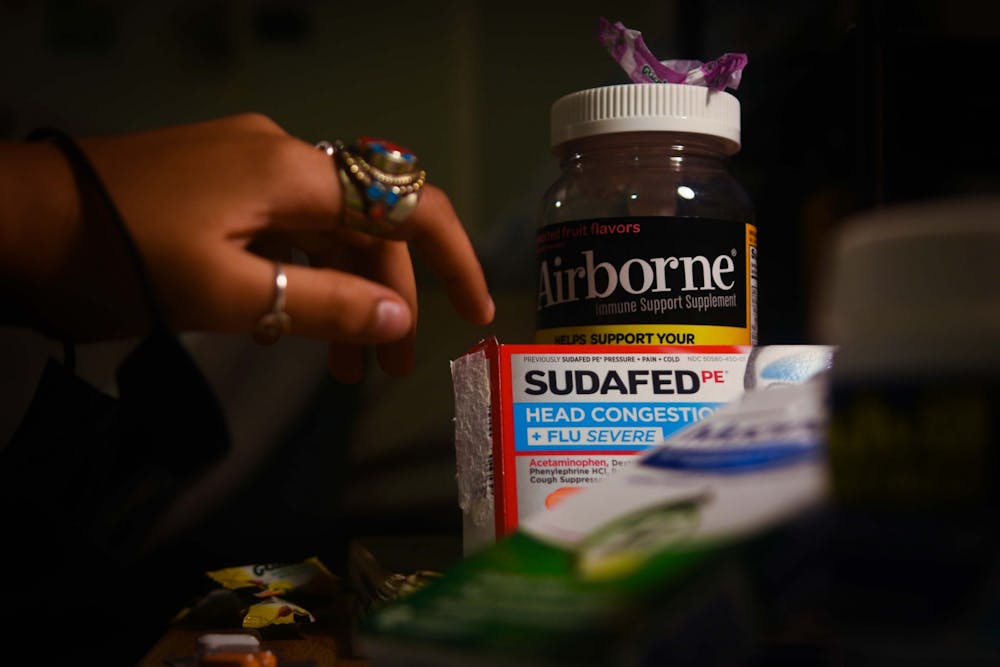
Students with the "freshman plague" have various flu-like symptoms.
Credit: Adya GuptaMany first-year students have been sick with coughs, sore throats, congestion, and fatigue — but campus positivity rates for COVID-19 remain low.
These students have come down with what is known colloquially as the "freshman plague," which includes symptoms similar to those of COVID-19. COVID-19 cases have remained low since students returned to campus, with a positivity rate under 0.50% for four straight weeks. Student Health Service Medical Director Vanessa Stoloff said that the low positivity rate means most students are probably experiencing some form of the common cold that shows up on campus every year.
“There’s nothing happening now, except COVID-19, that we don’t experience traditionally at this point of the year, and it’s important that we put that in perspective and be mindful," Chief Wellness Officer Benoit Dubé said. "We have survived the ‘freshman plague’ before; we will survive this one again."
Students with the "freshman plague" have various flu-like symptoms, many of which would give students a Red PennOpen Pass if reported. Some of the symptoms listed on the PennOpen Pass daily symptom check include a new cough, unusual fatigue, and fever above 100.0 degrees Fahrenheit or feeling feverish (chills, body aches).
Penn requires students to report their symptoms on PennOpen Pass every day, but it is only checked upon entry to certain campus buildings, including the libraries and COVID-19 testing centers. Students who experienced symptoms that would lead to a Red Pass said they were hesitant to accurately report their symptoms due to concerns about falling behind in class.
College first year Michelle Wen said she has had symptoms of the "freshman plague" since New Student Orientation. Her symptoms started out with a sore throat, cough, and congestion, and fluctuated frequently over several weeks.
“I couldn't tell if I had a fever or not … which is why I got tested again," Wen said. "Every day is a new day.”
Wen has been following the University's COVID-19 testing guidelines and has not tested positive since arriving at Penn.
She worried that by truthfully reporting her symptoms and seeking help from Student Health Service, she would need to miss more class time and fall further behind in school.
University health officials urged students who are experiencing symptoms to avoid exposure to others and take over-the-counter medication to manage symptoms. Although they acknowledged the psychological stress caused by being unable to attend class, they emphasized that staying home to rest is the best way to recover quickly and protect other members of the Penn community.
University health officials also urged students to continue to follow COVID-19 prevention guidelines, including mask-wearing and frequent hand-washing.
Wharton first year Rachel Zhang has been experiencing similar symptoms to Wen for several weeks.
“Sometimes they vary; for the first two weeks, it was just a lot a lot of coughing and a sore throat," Zhang said. "Now, it’s still some coughing, but not as often, and a lot of congestion and fatigue.”
Zhang has also tested negative for COVID-19 consistently after arriving on campus in August.
Both students said they have experienced academic setbacks due to their illnesses. Although they skipped several large lectures to avoid spreading the "freshman plague," they eventually returned to in-person classes to avoid falling too far behind.
“It hasn’t been that bad yet, but as we’re hitting midterm season, I’m getting concerned," Wen said. "I need to be able to study and actually perform well, and you’re obviously not going to be able to do that if you’re not feeling well.”
Zhang agreed, pointing out that the compounding stress of being unable to attend lectures while sick has made the transition to college more difficult.
On top of the academic strain, students also have concerns about visiting SHS for treatment and care. In order to visit SHS, students must present a Green PennOpen Pass, according to the SHS student portal. Students who don't have a Green PennOpen Pass on the day of their visit should call to cancel their appointment.
“It’s really hard to actually get ahold of them, and I don’t want to risk getting a Red PennOpen Pass by going,” Wen said. “As a [first year], I don’t really know how to navigate it.”
Senior Reporter Jonah Charlton contributed reporting.
The Daily Pennsylvanian is an independent, student-run newspaper. Please consider making a donation to support the coverage that shapes the University. Your generosity ensures a future of strong journalism at Penn.
Donate



